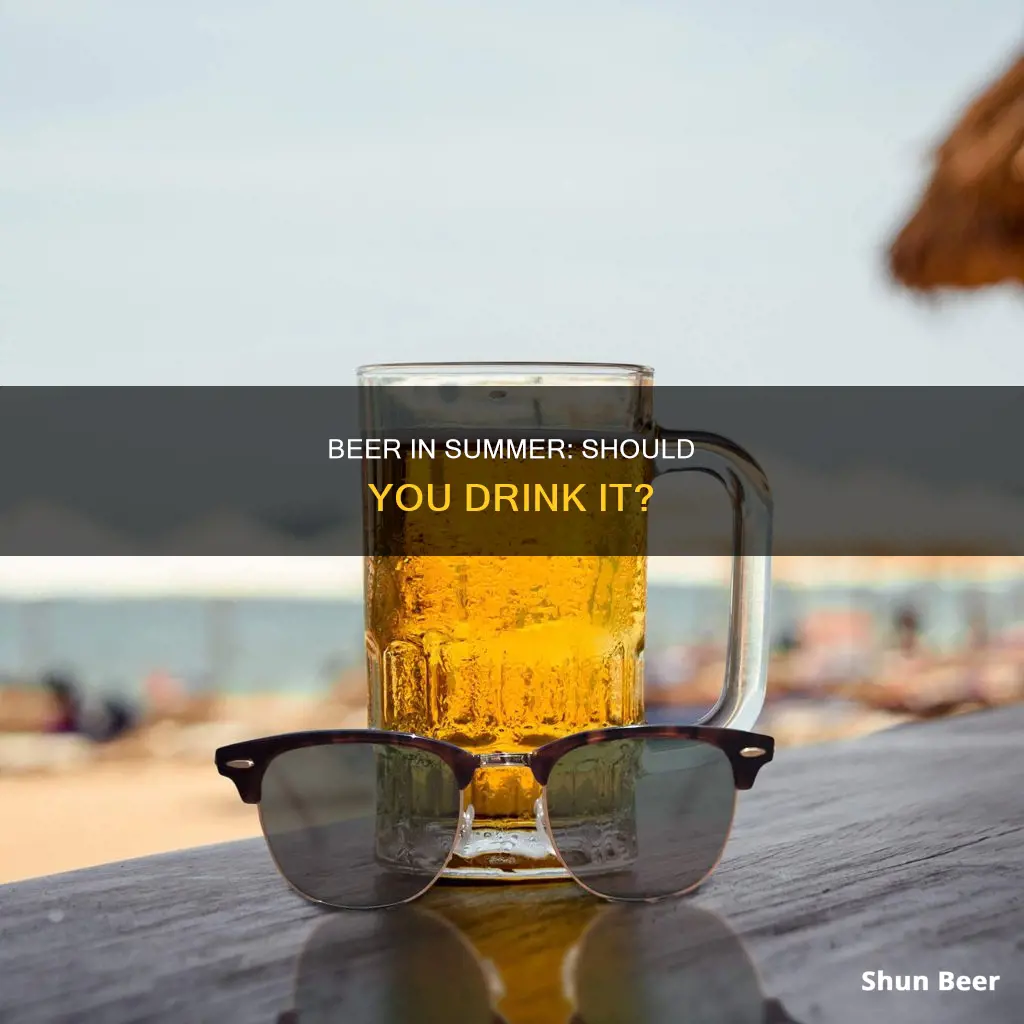
Beer is a popular drink during the summer months, often enjoyed at barbecues, pool parties, and other outdoor activities. While beer has several health benefits, such as preventing coronary heart disease, ischemic stroke, and digestive tract infections, it is important to drink in moderation and be mindful of certain risks associated with drinking beer in the summer. One of the main risks is dehydration, as alcohol is a diuretic that increases urination and perspiration, leading to a higher risk of dehydration in hot weather. Additionally, drinking beer in the summer can increase the risk of heat stroke, as alcohol impairs the body's ability to regulate its temperature. Other considerations include avoiding drinking ice-cold beer, which can cause gastrointestinal issues, and not using beer as a thirst quencher, as it can actually make people feel thirstier due to its alcohol content.
What You'll Learn

Beer doesn't quench thirst
While beer may seem like a good idea to quench your thirst in the summer, it may not be the best option. Here's why beer doesn't quench thirst:
Beer Dehydrates
Beer is a diuretic, which means it increases urine output and leads to dehydration. This is because alcohol inhibits the release of the antidiuretic hormone (ADH) or vasopressin, which is responsible for helping the kidneys maintain fluid balance. As a result, you will urinate more frequently, losing fluids and becoming dehydrated. This is further exacerbated by increased sweating in hot summer weather.
Alcohol Stimulates the Body
When alcohol enters the body, it stimulates the secretion of adrenaline, speeds up the heartbeat, expands blood vessels, and increases heat loss through the evaporation of water. All of these processes can make you feel hotter and thirstier. Alcohol also stimulates the kidneys, speeding up metabolism and urination, leading to further fluid loss.
Beer May Make You Thirstier
The stimulating effects of alcohol mentioned above can ultimately lead to increased thirst. Additionally, the diuretic effects of alcohol can cause a false sense of hydration. You may feel like you're taking in a lot of fluids by drinking beer, but the dehydrating effects of alcohol counteract this.
Beer Should Be Consumed in Moderation
Beer typically has an alcohol content between 4.5% to 9%, and this alcohol is absorbed into the body more quickly than water. Therefore, excessive consumption of beer can lead to dehydration. It is always recommended to drink plenty of water along with beer to stay hydrated.
Beer May Not Be the Best Option for Rehydration
While beer contains a high percentage of water, the diuretic and dehydrating effects of alcohol mean that it is not the best choice for rehydration. Very low alcohol or non-alcoholic beers with added sodium may be better options for rehydration, as they can hydrate better than water under specific conditions. However, these beers are not as readily available as regular beers, which are usually above 5% ABV.
In conclusion, while a cold beer may seem tempting on a hot summer day, it is important to understand that it may not effectively quench your thirst due to its dehydrating effects. To stay properly hydrated, it is advisable to drink water along with beer or opt for low-alcohol or non-alcoholic alternatives.
Beer Traps: Effective Snail Control or Urban Myth?
You may want to see also

Avoid beer with barbecue
While beer and barbecue may seem like a match made in heaven, there are some good reasons to avoid this combination.
Firstly, favourite barbecued foods like seafood, liver, and meat have a high purine content, and beer also contains purines. Consuming them together would result in dangerously high levels of purine in the body, which might lead to gout. In extreme cases, carcinogens like benzopyrene, released during the barbecue process, will be absorbed much faster when mixed with the alcohol in beer, increasing health complications.
Secondly, beer may not be the best beverage to accompany a barbecue on a hot summer's day. Beer has a diuretic effect, increasing urination and fluid loss. In the summer heat, this can lead to dehydration. Alcohol also stimulates the kidney, speeds up metabolism, and increases sweating, further contributing to fluid loss. Therefore, it is essential to drink plenty of water or light tea to stay hydrated when consuming beer in the summer.
Instead of beer, consider pairing your barbecue with simple finger foods like nuts, nachos, or fries, and choose water or other non-alcoholic beverages to stay hydrated.
Additionally, if you are watching your calorie intake or following a strict diet, beer may not be the best choice due to its calorie content and its ability to increase appetite and cravings for more food.
DayQuil and Beer: A Safe Mix?
You may want to see also

Avoid ice-cold beer
While drinking an ice-cold beer in the summer may be tempting, there are several reasons why you might want to avoid it. Firstly, ice-cold beer can lead to gastrointestinal issues as the temperature of the gastrointestinal tract decreases rapidly, affecting blood flow and ultimately impacting the digestive system. This can result in diarrhoea and other digestive problems.
Secondly, drinking ice-cold beer can affect your ability to taste the beer's full range of flavours and aromas. Beer is carefully brewed to balance flavours, and when it is ice-cold, your taste buds are less responsive, leading to a bland and less enjoyable drinking experience. The colder temperature can also cause the carbon dioxide to escape more quickly, resulting in less carbonation and excess foaming.
Additionally, ice-cold beer can contribute to dehydration, a common concern during the summer months. While it may seem refreshing, the alcohol in beer acts as a diuretic, increasing urination and fluid loss. This effect, combined with increased sweating in the heat, can lead to dehydration. Therefore, it is essential to drink water along with beer to stay properly hydrated.
Moreover, ice-cold beer can affect your overall drinking experience. As the ice melts, it dilutes the beer, watering down its flavour and making it less appealing. This can detract from the enjoyment of the beverage, especially for craft beer enthusiasts who appreciate the unique flavour profiles and nuances of different brews.
Finally, drinking ice-cold beer can be a shock to your system, especially during hot summer days. The extreme temperature difference can impact your body's ability to regulate its temperature, leading to discomfort and potentially affecting your health. Therefore, it is advisable to enjoy your beer chilled but not ice-cold to maintain a pleasant drinking experience while minimising potential negative consequences.
Beer and Watermelon: A Safe, Sweet Combo?
You may want to see also

Beer and health risks
Beer is the most widely consumed alcoholic drink globally, and while it does have some health benefits, there are also several risks associated with drinking it. Here are some of the health risks of drinking beer, particularly in summer:
Dehydration
Beer might seem like the perfect drink to cool off with in the summer, but it can actually make you feel thirstier. Alcohol stimulates the secretion of adrenaline, speeds up your heartbeat, expands blood vessels, and increases heat loss through the evaporation of water, making you sweat more and feel thirstier. It also stimulates the kidneys, speeding up metabolism and urination, leading to further water loss. Therefore, it is important to drink plenty of water along with beer to stay hydrated.
Increased Health Risks When Mixed with Barbecue
Barbecued foods like seafood, liver, and meat have high purine content, and when combined with beer, which also has high purine levels, it can result in dangerously high levels of purine in the body, potentially leading to gout. Additionally, carcinogens like benzopyrene, released during the barbecuing process, are absorbed more quickly when mixed with alcohol, increasing health complications.
Gastrointestinal Issues
Drinking ice-cold beer can lead to gastrointestinal issues as the temperature of the gastrointestinal tract decreases rapidly, affecting blood flow and potentially causing diarrhoea.
Weight Gain and Malnutrition
Beer is associated with weight gain, partly due to its calorie content, typically ranging from 120 to 150 calories per bottle. Beer also promotes appetite, leading to increased caloric intake. Alcohol consumption takes precedence over fat burning, so frequent beer drinking, along with a high-calorie diet, can result in fat storage in the body. Additionally, excessive beer consumption may lead to malnutrition as it is high in empty calories and provides minimal nutritional value, potentially displacing essential nutrients from the diet.
Cardiovascular and Heart Health Issues
While limited consumption of beer may have some benefits for the heart, overconsumption can lead to an ongoing increase in heart rate and negatively impact cardiovascular health. Beer consumption has been linked to higher cholesterol levels and can also raise blood pressure levels.
Other Health Risks
Drinking beer can lead to heartburn, the development of a "beer belly," intoxication, hangovers, and interference with blood sugar levels. It can also interact with certain medications, such as sedatives and antibiotics, and may increase the risk of mosquito bites, leading to potential exposure to mosquito-borne illnesses.
Beer and Worker Stamina: Is There a Link?
You may want to see also

Beer and dieting
The calories in beer are also easy to overdo because alcohol reduces your inhibitions and stimulates your appetite, often leading to overeating. The food typically paired with beer, such as pizza, wings, and other fried foods, tends to be high in calories and fat. This combination of alcohol and calorie-rich food can make losing weight extremely challenging.
According to an April 2014 study in the American Journal of Public Health, alcohol consumption is linked to weight gain and obesity. So, if you're trying to lose weight, cutting out alcohol or significantly reducing your intake may be necessary. However, if you still want to include beer in your diet, there are a few strategies you can try.
One approach is to switch to light beers, which typically have around 100 calories or less. Light beers also contain about half the carbohydrates of regular beer, and lower-carb diets are often associated with weight loss. Additionally, drinking water before, during, and after consuming beer can help counteract the dehydrating effects of alcohol and may reduce the urge to overeat.
It's also important to increase your exercise regimen and monitor your alcohol consumption. According to the Harvard T.H. Chan School of Public Health, moderate drinking is defined as no more than one to two drinks per day for men and no more than one drink per day for women. Staying within these limits can help you manage your calorie intake and may allow you to include beer in your diet while still losing weight.
It's worth noting that there are potential health risks associated with drinking beer in the summer. Beer should not be considered a thirst quencher, as it can lead to dehydration due to its diuretic effects and the stimulation of the secretion of adrenalin, which increases the loss of water from the body. Additionally, drinking ice-cold beer can lead to gastrointestinal issues. Therefore, it's crucial to drink in moderation and stay properly hydrated by consuming water along with your beer.
Beer and Ice Cream: A Delicious Combination or a Disaster?
You may want to see also
Frequently asked questions
Yes, but drinking in moderation is key. Beer has an alcohol content of 4.5% to 9% and can be dehydrating, so it's important to drink water and stay hydrated.
Beer is rich in amino acids and vitamins, which can help improve your appetite, tonify the spleen, and dispel summer heat. It also helps prevent coronary heart disease, ischemic stroke, type 2 diabetes, and digestive tract infections.
No, beer may actually make you feel thirstier and sweat more. It stimulates the secretion of adrenaline, speeds up your heartbeat, expands blood vessels, and increases evaporation and urination, leading to increased water loss.
Avoid drinking ice-cold beer as it can cause gastrointestinal issues. Don't use beer as a thirst quencher, and make sure to drink plenty of water. Avoid driving after drinking beer, and be cautious of the increased risk of dehydration, especially when spending time in the sun or water.
Yes, avoid pairing beer with barbecue foods like seafood, liver, and meat, as they have high purine content. Mixing beer with these foods can result in dangerously high levels of purine in the body, which may lead to gout.







